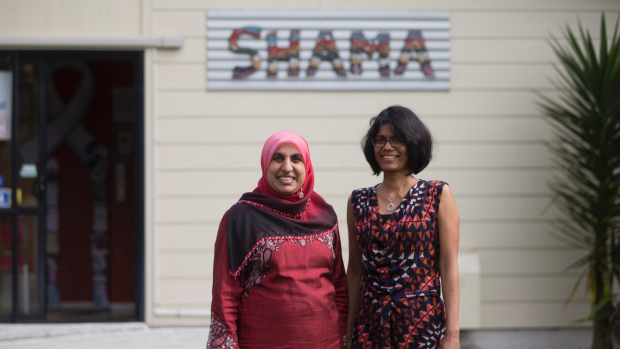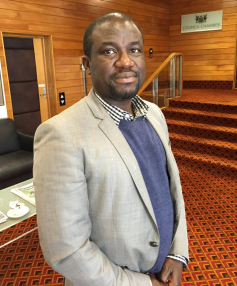Hamilton Muslims are threatening French Style Jihadi attacks if they do not get the levels of welfare that they want from the government.

Hamilton risks social unrest similar to that seen in France if it ignores the plight of its refugees, city leaders warn.
The social agencies at the forefront of helping refugees cope say many live in cold, damp houses and struggle to access basic services. Since 2005, more than 600 refugees have shifted to Hamilton in search of a new life and agencies are urging city leaders to do more to help. At least one city councillor backs that call in the wake of events in Europe.
Councillor Dave Macpherson, speaking at the council’s community forum subcommittee meeting, said Hamilton can’t afford to have its migrant and refugee communities disconnected from mainstream society and living in substandard housing.
Hamilton could learn valuable lessons from what has happened in Europe, he said.
“You only have to envisage a few more years of something like this and you’re in a situation like they’re having in France, ” Macpherson said.
France and Belgium’s migrant communities have come under increasing scrutiny following a series of jihadist attacks across Paris last month.

Anjum Rahman, strategic manger of Shama – Hamilton Ethnic Women’s Centre Trust, said refugees are frequently referred to the trust for assistance.
However, refugees’ needs are complex and there is a lack of central government funding to provide long-term support.
“An emerging big issue is around accessing interpreters and translators. Also, our social workers do not have the specialist skills to deal with children who have experienced sexual violence,” Rahman said.
Language difficulties mean refugees struggle to use public transport, isolating them. They also lack confidence when dealing with government agencies.
Then there is the urgent need to get refugee families into warm, dry homes.
“Because they have a home, Housing New Zealand will tell refugees it can’t assist them because its focus is on people who don’t have homes,” Rahman said.
“Housing should be a joint responsibility of local and central government because it’s about the welfare of the city. Good housing reaps so many benefits in terms of health, education and crime. All these issues can be solved by just having a warm, safe house.”
Dr Priya Kurian, Shama’s board chairwoman, said Hamilton must be active in preventing such isolation, as seen overseas.
“These are the kind of issues which seem easy to ignore, but that is what has happened in France. It’s a real phenomenon of ghettoisation and a lack of social integration,” Kurian said.
Deanne McManus-Emery, council’s community development and leisure manager, said she would seek talks with Housing NZ about the refugee community’s concerns.
Multicultural New Zealand executive director Tayo Agunlejika said Hamilton is an increasingly diverse society.
It is vital all residents are given the chance to integrate into wider society, but feel safe and confident to practise and share their culture.
Reflecting on the unrest in France, Agunlejika said people need to feel as if they belong in their community.
It isn’t in New Zealand’s interest to have isolated communities, such as a Chinatown, within a city, he said.
Rahman said if the issues facing refugees aren’t adequately addressed, then the problems will be exacerbated in coming years.
“I think the issues generally arise with the children, because the parents already feel like they’re a foreigner in another country and they’re dealing with that,” she said.
“But for the kids who are born and grow up here and to be made to feel like this isn’t your country or you don’t belong here … it’s a huge displacement.
“If you don’t look after the parents and don’t deal with all that at that level, you’re setting yourself up for that next generation to really feel disfranchised and marginalised and just upset because they don’t have the same opportunities and they can’t fit in.”
Creating connections
Anjum Rahman, strategic manager of Shama – Hamilton Ethnic Women’s Centre Trust, said there are practical things people can do to make refugees feel welcome.
* Speak slower, not louder, as people often need a little help with the language. “If you take the time to explain things, they usually tend to get it.”
* Refugees need to feel part of the community – don’t tell them to go home. “They are people who have come here to make New Zealand their home. They want to belong here.”
* People can volunteer with organisations focused on helping refugees and migrant families, such as Red Cross refugee resettlement services, Multicultural New Zealand or Shama.
* Assist them with employment opportunities. “Believe in their skills and the experiences that they bring to this country. Give them a chance; these people are people who really do want to make a success of their lives here. They really do work hard, are ready to contribute. They just need someone to give them an opportunity.”
* Celebrate their culture. “Enjoy the diversity they bring, the various cultures, the food. Enjoy having them here and let them enjoy having you.”
Hamilton at a glance
* About 30,000 people, or almost a quarter of Hamilton’s population, identify with a culture or ethnicity that is not Maori or New Zealand European.
* There is a higher proportion of migrants in Hamilton who have arrived in the past four years compared to the national average.
* More than 600 refugees, from 12 countries, have moved to Hamilton in the past 10 years. Since 2013, a large majority of refugees have come from Colombia, Myanmar and Afghanistan.
* Twenty-five per cent of those who identify as coming from an ethnic community say their home is too cold or difficult to heat. Twenty-one per cent describe their home as damp.
* When asked if their household income is enough to meet their everyday needs, 62 per cent of ethnic respondents said it was “just enough” or “not enough”.
Nurturing Hamilton’s diversity key to social harmony
